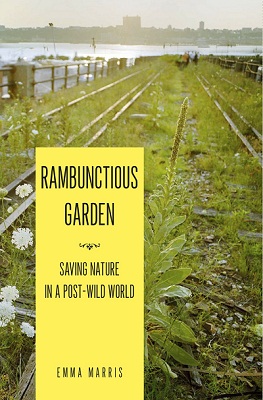The conservationist ideology is full of contradictions, according to a new book. Elberry, who anyway would be “happier in a post-apocalyptic wasteland, daubing himself with blue woad and hunting his enemies with a stone club”, reviews it…
I’d like to share a revelation that I’ve had during my time here. It came to me when I tried to classify your species. I realized that you’re not actually mammals. Every mammal on this planet instinctively develops a natural equilibrium with the surrounding environment, but you humans do not. You move to an area, and you multiply, and multiply, until every natural resource is consumed. The only way you can survive is to spread to another area. There is another organism on this planet that follows the same pattern. A virus. Human beings are a disease, a cancer of this planet, you are a plague, and we are the cure.
(Agent Smith in The Matrix)
In many ways, Smith is the true hero of The Matrix. He wishes to eradicate humanity, with all its filth and chaos and depredation. He represents purity; the disembodied, gnostic purity of Apple, of the internet; the perfect software. He is also a rogue program, as if to say there will always be a flaw in the system, that imperfection is inherent to systems. There can be no perfectly-tuned clavier; nor a pure garden or world.
And so on to Rambunctious Garden. Marris’ book is a well-written, sober, informative and entertaining account of varieties of conservation. Essentially, her conservationists want to preserve forms of natural life, to prevent extinctions. Human beings are generally the enemy, the cause of extinctions. The more fundamentlist conservationists wish to restore nature to a baseline state, that is, before human intervention:
For many conservationists, restoration to a prehuman or pre-European baseline is seen as healing a wounded or sick nature. For others, it is an ethical duty. We broke it; therefore we must fix it. Baselines thus typically don’t just act as a scientific before to compare with an after. They become the good, the goal, the one correct state.
We like to imagine a pre-1492 America as a paradise of noble savages. However:
The inhabitants of North and South America had grand cities, expansive agricultural fields, large-scale irrigation, and huge earthworks, including agricultural terracing, residential platforms above floodplain aquaculture works, and massive religious mounds – some in the shapes of animals.
The Native Americans also used fire to clear land for pasture. So we must push purity back before 1492. Quite a bit further. Marris writes of the wave of extinctions beginning about 11,000 BC:
[…] the Americas lost a slew of large beasts, including wild horses, mammoths, mastodons, sixteen groups of ground sloths, the glyptodont (something like a four-thousand-pound angry tortoise with a spiked mace for a tail), short-faced bears that would make polar bears look puny, camels, sabertooth tigers, lions and cheetahs. That’s right. Not so long ago an American cheetah lounged around in the branches of the oak trees dotting the Great Plains. All of these large animals – “megafauna” – died out roughly around the same time in a burst of extinction. Many scientists believe that humans killed them. Tellingly, humans arrived just before the extinction boom.
Both the climate and human consciousness changed round about this time but over such a distance it is difficult to draw conclusions. Perhaps the newly-conscious humans wiped out the glyptodonts; perhaps consciousness, climate, and extinction were all part of some broader change. However, Agent Smith would not hesitate. And on the face of it, he would have good cause to blame the human race for, well, everything. Ecosystems naturally settle into a natural harmony, because they are natural. Then human beings come alone and ruin it for everyone. We don’t just kill dodos. We introduce “invasive species”, who wreak chaos on a balanced ecosystem. So on a little island near New Zealand:
[…] according to legend, in 1894 a single cat belonging to a lighthouse keeper – the invader – dispatched the very last members of a species called the Stephen’s Island flightless wren. More recent historical research suggests that the deed was done over a couple of years not by a single cat but by a feral population descended from a “she cat heavy with kitten” accidentally let loose on the island.
Elsewhere, the Australian brown tree snake stowed itself away on a human ship, then proceeded to kill off most of the forest-dwelling birds on Guam. Without the birds, the fruit trees’ seed isn’t so widely dispersed, and the trees will most likely “cluster together in expanding single-species rings rather than intermixing.” So the introduction of new species can lead to diminished variety; some forms of life don’t co-exist easily with others.
Conservationists have created artificial enclosures in which they can partially recreate a baseline ecosystem. Sometimes they introduce foreign but roughly equivalent species, which must be fun (there are no aurochs left, will dobermanns do?). The substitutes for American animals are often African, which seems a bit of a stretch but if you go far back enough almost anything can be justified. In addition, part of the work involves killing invasive species such as rabbits and cats. Not merely culling the “invaders”, but totally exterminating them. One wonders how such a strategy would be received were it applied to human cultures. The cats and rabbits doubtless would not consider themselves invaders but there it is.
These enclosed ecosystems are themselves a product of human ingenuity:
Holding small areas like Scotia to states that resemble historical baselines may be possible, depending on where the area is and what date one would like to return it to. But to do so it will take human intervention, both in the beginning and indefinitely into the future. A historically faithful ecosystem is necessarily a heavily managed ecosystem. It is not quite the ‘pristine wilderness’ many nature lovers look to as the ideal. And there’s the paradox that unravels the idea of ‘pristine wilderness’. If we define wild as ‘unmanaged’, then the ecosystems that look the most pristine are perhaps the least likely to be truly wild.
The conservationist ideology is philosophically hollow. It’s not that it’s wrong; but it makes large claims without solid justification. I personally would be happier in a post-apocalyptic wasteland, daubing myself with blue woad and hunting my enemies with a stone club. But, as Marris outlines in her conclusion, the conservationist ideology is full of contradictions. If all living things deserve to live, how can one justify exterminating cats and rabbits? If you hold up an idea of pristine, unsullied nature as your goal, the question must be why? Why is it superior to a park or farm or garden? It’s interesting but is it really objectively commendable?
Marris in the end suggests a realistic, balanced appreciation for nature, what she calls the rambunctious garden – meaning, I guess, the unpredictable variety of life, to be found as much in a back garden or by a polluted river as in a protected sanctuary. It is perhaps a question of man’s place in the world. Are we a part of the world, and so a part of nature? Or are we apart from nature, an aberration? If lions naturally and without human interference wipe out gazelles, all well and good. If the exterminating lions were introduced by human beings, bad. This presupposes that human beings are not a part of nature; that they are more like Lovecraftian monsters, in violation of nature.
The extreme conservationists seem to me part of the very modern trend, to try to escape the human perspective, to perceive reality from outside humanity. On the one hand, the transhumanists and their ilk, attempting to become machines. On the other hand, the hardcore conservationists. One could say it is a part of human nature, to deny it.











Smith is the true hero of The Matrix. He wishes to eradicate humanity, with all its filth and chaos and depredation.
Excellent post. While I wouldn’t suggest Agent Smith’s views are mainstream, it is suprising how many academics and lefty activists come close to arguing along these lines. The pattern whereby reformers travel a path from a noble concern about specific excesses and problems to an anti-human, abstract-laden world that condemns everything and everybody has been repeated many times in history, and not just with respect to environmental issues. The young idealist concerned with cleaning up a fetid river or establishing a national park can often be found in middle age chairing a UN working group (all expenses paid) on “global strategies” that concludes we have to “urgently” change “the way we do things” and suggests we could start with a massive culling of the population and a universal return to subsistence gardening.
Perhaps the newly-conscious humans wiped out the glyptodonts
I’m not quite sure why I dissolved into giggles when I read that, but I did. Perhaps I’ve read too many dubious Darwinist just-so stories. In any even, the pre-historical myths and fables of the naturalists can be wackier than anything contained in scripture.
top commenting Peter, you’ve said everything I was about to say, that this eden fixation seems to be somewhat hardwired in people to a varying degree – also known as The Kingsnorth Effect
Yes, worm, and it’s not just within environmentalism that one finds this impulse. Economics too. Think of how many religious and political thinkers have in various ways aligned themselves against the steady march of increased material prosperity ever since those new-fangled banks started appearing in 14th century Lombardy. They start by focussing on real, concrete problems like worker exploitation, peasant dispossession, slums and urban sprawl, material excess, etc., but then move on to more general abstract critiques that steadily reveal a loathing of the dynamism and change inherent in growth and prosperity, and a longing for some kind of bucolic, stable, neo-feudal utopia barely above subsistence level. That is why I think it is so hard to defend the free market or “capitalism” in intellectual debate today, despite the fact it is objectively obvious how much better they have made our lives. Somehow you can always be made to feel like you are playing Russian Roulette with Mother Earth for a third car or think DisneyWorld is of a higher aesthetic order than the Parthenon.
The left has fallen headlong into this irrationality despite the paradox of their rigorous belief in materialism and rejection of matters spiritual (especially the modern left. In the thirties, socialists celebrated electrification by loudly cheering the turning on of lights, but today they get together on Earth Day like sinful pilgrims at Lourdes to turn them off in guilty silence). But they aren’t the only ones. Think of how many of us old-fashioned conservative toadies instinctively give a half-cheer to the Ruskins of the world valiantly digging ditches and holes around their estates to personally protest the horrors of laissez-faire capitalism. Something inside leads us to be impressed with such creative and principled defiance and keeps us from seeing that the man was clearly bonkers.
I suffered through one of the Matrix movies, which pegged the bogometer about 10 minutes in and did not let up. I amused myself as best I could imaging the that “The Matrix” was really a clever pun for “The Maastricht”, as HAL is IBM shifted one letter up, and that this was about the subjection of Europe by the EU. In any case, I don’t remember Agent Smith saying much of anything, just punching.
The Conservationists will win in the end.
We are having some temporary success in our fight against entropy, but ultimately entropy will crush us.